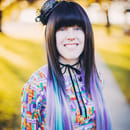By Ayesha Riaz
As an Asian-American growing up in the Midwest, I realized very quickly that there were many differences between me and those who had been born and raised in America their entire lives. I immigrated to Chicago along with my parents in 1994, and was raised here as well, but my place of birth and mother language always set me apart. Growing up in my household, both my parents spoke only Urdu, and so did the rest of my family in Chicago. The only exposure to English I ever received as a child was through the TV. When I first enrolled in day care, I remember sobbing because I didn’t want to speak English, because I couldn’t communicate that well with it. Eventually, I learned and school became not only bearable, but fun. However, at home, my parents continued to communicate in only Urdu, so I began to differentiate the two languages as two different parts of me.
I picked up English fairly quickly because I was young and also started to read at a very early age. However, my mother (who taught me how to read) spoke broken English. My father spoke English only outside of the house but not inside with the family. Eventually, I would phase out of speaking Urdu and I now speak primarily in English, even to my parents, who respond in Urdu. Our communication level is really high. I completely understand what they’re saying in Urdu, and they completely understand what I’m saying in English. There are still some discrepancies with the language communication itself. Certain Urdu words have no English equivalent. Certain English words are difficult to explain in Urdu. It doesn’t happen often, but when it does, there’s a moment of silence as all of us figure out how to proceed.
This language barrier exists, and it’s not the best thing in the world. Cultural disconnect was bound to happen because I grew up in a completely different environment than my parents, but language barriers are an issue that goes deeper because they separate generations.
As I got older, I realized that a lot of people from my parents’ generation immigrated to America around the same time and although their own English was not perfect, their children’s language was as a result of growing up here. My parents’ generation worked relentlessly for their children, and it is absolutely awful when despite all of their hard work, they are belittled for not speaking the “correct” way. Although I have not gotten made fun of for my accent, I have gotten made fun of for my lack of accent. It runs both ways when you’re part of a hyphenated demographic. Today I don’t differentiate myself as two languages as two parts of me. I embrace the hybrid.
What I have learned is that mastery of a single language (other than your mother tongue) has absolutely no indication of how intelligent you are. I am incredibly proud of my parents for starting over in a different country with different customs, different foods and above all, a different language, the very basic form of communication. I once read that you should never make fun of a person who speaks a broken language because they know another one that you potentially don’t.


